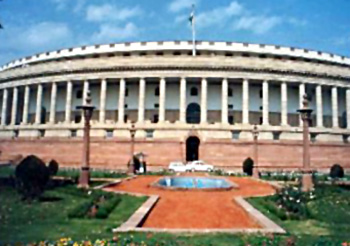 The sessions of Lok Sabha divide its job into the sessions namely the Budget Session which begins from February to May; followed by the Monsoon Session which starts from the month of July to September; which again is followed by the winter session in the month of November and December. The main aim is to discuss the issues as well as their work process on the floor of the house.
The sessions of Lok Sabha divide its job into the sessions namely the Budget Session which begins from February to May; followed by the Monsoon Session which starts from the month of July to September; which again is followed by the winter session in the month of November and December. The main aim is to discuss the issues as well as their work process on the floor of the house.
On regular days the session assembles at 11.00am to 1.00pm in the first half and at 2.00pm till 6.00pm in the second half. The first hour of every session is called the Question Hour during which various government ministries will be asked questions which are to be answered by them in a specific time period. The Rules of Procedure and Conduct of Business in Lok Sabha and Directions issued by the Speaker from time to time thereby control the procedure in Lok Sabha. The items of business notice of which is received from the Ministers or Private Members and admitted by the Speaker, are included in the daily List of Business, which is printed and circulated to members in advance. At the time fixed for the beginning of a sitting the Speaker of the House after calculating that 55 members are present in the House which number including the Speaker is required to from the quorum.
The Lok Sabha begins the day with Question Hour during which the representatives of people are free to ask questions which the concerned ministry is supposed to answer in the house. This has been regarded as the most representative. After the Question Hour, the House takes up diverse items of work before proceeding to the main business of the day. The main business of the day may be consideration of a Bill or financial business or reflection of a resolution or a motion.
The next job of Lok Sabha is to pursue the legislative activities which begin with representation of bills which can be both government bill as well as private bill. A bill when represented by private members it is called private bill .All he bills goes through three stages called three readings before it is passed. To become law it must be passed by both the Houses of Parliament, Lok Sabha and Rajya Sabha, and then approved by the President. The presentation of the annual Budgets General and Railways their discussion and voting on the various demands for grants followed by passing of Appropriation Bill and Finance Bill, which is long drawn process, take up a major part of the time of the House during its Budget Session every year.
Within other activities one of the most important activities is to pass Motion or a Resolution. A Resolution is relevant because with these efforts are made to draw the attention of the house to such matters of public interest which needs attention. Government may move a Resolution or a Motion for obtaining the permit to a scheme or opinion of the House on an important matter of policy or on a grave situation. Similarly, a private member may move a resolution or motion in order to draw the attention of the House and of the Government to a particular problem. The last Two and Half hours of sitting on every Fridays are generally fixed for contract of private members` business.
A Half-an-Hour Discussion can be raised on a matter of sufficient public importance, which has been the subject of a recent question in Lok Sabha irrespective of the fact whether the question was answered orally or the answer was laid on the Table of the House and the answer, which needs elucidation on a matter of fact. Normally not more than half an hour is allowed for such a discussion. Members may raise discussions on matters of urgent public importance with the permission of the Speaker. Such discussions may take place on two days in a week. No formal motion is moved in the House nor is there any voting on such a discussion.
Thus the entire working of the Parliament depends on the active participation by the members in these sessions. No bills and resolutions are passed without the number of members present and voting. In a way it can be said that larger the participation, more democratic it will be in representation.




















